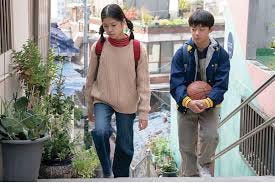First it was Minari. Then it was Netflix’s Beef.
A24’s Past Lives is the latest iteration of the Korean American experience on the big screen and it might just be the best.
I don’t know why I had never heard of this movie before, but I just watched it last week and I’ve never felt more connected to a movie. Minari was groundbreaking as it was the first to highlight our parent’s struggle in a new land. Beef’s LA/SoCal church scenes were familiar in all the best (and worst) ways. But Past Lives encapsulates a specific brand of Korean American han-and-heartache like no other.
The movie stars Greta Lee as Moon Na-young, who emigrated from Korea to Canada when she was 12 years old. Na-young leaves behind her childhood best friend and crush, Haesung (Teo Yoo). The two reconnect 12 years later—via dial-up Skype—with Nayoung having moved to New York to pursue her theater career and changing her name to Nora. Nora and Haesung pick up where they left off but the two can never fully commit to their mutual feelings of attraction. It’s not unrequited love, it’s uncommunicated love. Haesung refuses to visit Nora in New York and Nora refuses to visit Korea. The two reach a fork in their road and decide to part ways.
Twelve years pass again and by now, Nora is married to a Jewish writer and Haesung has just broken up with a long-time girlfriend. After 24 years since they’ve last seen each other face to face, Haesung flies to New York and they spend a day taking in the sights of the city. As they stroll through the Big Apple, along with riding the Statue of Liberty ferry, Nora and Haesung share excruciatingly pained conversations guised in playful reminiscing, polite small talk, and passive flirtation.
Later that night, as she’s recapping the events of the day to her husband, Nora says, “[Haesung] is so Korean... he has all these really Korean views about everything. And I feel so not Korean when I'm with him. But also, in some way, more Korean. It's so weird." This line sent me into an emotional fit.
This is our Korean American experience.
When we encounter an overload of Korean culture, we feel not-Korean and more-Korean all at once. This single line of dialogue struck a Korean American minor chord that has never before been cinematically strummed. I was overjoyed that a movie made me feel seen, but heartbroken that it has taken this long. Gratitude for a breathtaking sunset but left with a longing for the light.
(*SPOILER ALERT*)
The next evening Nora and her husband have dinner with Haesung at an Italian restaurant, at Haesung’s request for pasta as his final meal in America. The three sit at the bar after dinner, with Nora in the middle between Haesung and her husband. It is at this moment, and as I’m watching this scene unfold, I realize Past Lives is a K-drama remixed through a Korean American filter.
The movie is a classic K-drama, but through the setting, backdrop, and emotional language of a Korean American. It contains the same love triangle motif, but with more melancholy, angst, and inner turmoil. In this sense, this is what makes Past Lives so unique. Nora's love triangle is a heartbreak and a fulfillment. Her love triangle is representative of a Korean American han. When we see her connection with Haesung, while being married to her white American husband, we see our experience personified. It is a cinematic metaphor for our experience:
We long for Korea, but we are married to America.
More accurately, we loosely hold reveries for a version of what our lives could have looked like if we stayed. The main question on our minds as we watch Past Lives is, "What if? What if we never moved to America? What could have been?”
It’s a tortuous exercise that borders on emotional masochism, but it’s a necessary path that must be traversed by every Korean American. In order to accept our lives in America, we must first acknowledge that Korea will always be an elusive fascination. A past life in Korea is a non-lucid daydream. It’s an emotional mirage. A fantastical illusion. We will forever be seduced by the what-if of a past life in Korea, but in the end, come home to the ill-fitting arms of a begrudging America.
Our lives are an anti-K-drama.
In the movie’s final scene, Nora says goodbye to Haesung, who enters his Uber to take him to the airport. She walks back to her husband, who is waiting for her on the porch steps in front of their apartment. She crumbles into his arms and lets out a soul-crushing sob as the two walk up the steps and the credits roll.
As viewers, we are reminded of one of Nora’s chilling lines from earlier in the movie.
"I crossed the Pacific Ocean to be here. Some crossings cost more than others. Some crossings, you pay for with your whole life."






Loving the analysis, PD, thanks for putting these feelings into words.